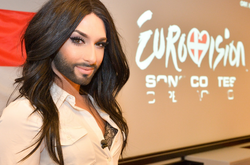
When I was a kid, I didn't understand the way people talked about politics and Eurovision at the same time. What could this gloriously over-the-top spectacle of sugar pop, pyrotechnics and big dresses possibly have to do with the grey-suited world of ballot boxes and people arguing on TV? And all those jokes about how countries voted for their neighbours...Why would you do that? Surely the point was to reward the best song?
It was hard not to see Conchita's victory as a 'fuck you!' to Putin, homophobes and gender normativity. I cheered when the UK gave our 12 points to Austria. But all that booing of the Russian entry... These are 17-year-old twins performing a slightly sappy number, not the embodiment of Russian foreign policy.
I suppose it's inevitable on some level, with 120 million viewers tuning in across the continent, that the acts will come to represent more than your average popstrels. Stereotypes, old grudges and jokes and tensions float around the acts and the judging.
So it's not surprising to see the same intensity applied to discussion of Wurst. I've seen her described as 'a bearded lady' 'a drag creation' and with various slurs. When her entrance was announced, Belarus tried to petition the organisers not to allow it because it would turn the competition into a "hotbed of sodomy" (which is massively ironic for an event I've known for half my life as 'gay Christmas', but obviously it's not quite the camp spectacular I know and love in Belarus). Russia and Belarus threatened to cut her performance out of their shows. Which they didn't. And how would they have explained who won, if they had?
| And then there was the debate over Wurst's appearance and presentation. Was she a drag act and if so was she mocking women, trans women, or femininity? I saw one tweeter saying that her win proved that 'the only acceptable trans woman is a cis man', which seems a little unfair when we're talking about a contest which a trans woman won in 1998. | at the party I was at, her participation sparked conversations about...smashing the gender binary, and just how stunning she looks with that beard. |
For what it's worth, I can't find a definitive answer on exactly how Wurst identifies. On herwebsite, she and Tom Neuwirth are described as: "a team just working in sync. Although they have never met before - they are constantly missing each other in the mirror. The private person Tom Neuwirth and the art figure Conchita Wurst respect each other from the bottom of their hearts. They are two individual characters with their own individual stories, but with one essential message for tolerance and against discrimination.
Because of the discrimination against Tom in his teenage years, he created Conchita. The Bearded Lady, as a statement. A statement for tolerance and acceptance- as it's not about appearances; it's about the human being. 'Everybody should live their lifes however they want, as long as nobody else gets hurt or is restricted in their own way of life.'"
I know that at the party I was at, her participation in Eurovision sparked conversations about gender, identity and gender performance as well as pronoun use, smashing the gender binary, and just how stunning she looks with that beard.
Wurst dedicated her win to "everyone who believes in a future of peace and unity". And really, when we're talking about a song contest originally created to bring Europe together, isn't that the best possible winner?
Squeamish Louise


 RSS Feed
RSS Feed
